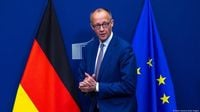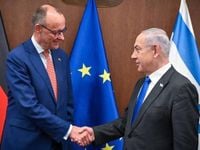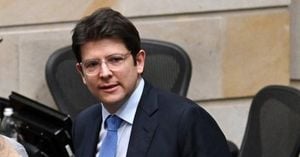German Chancellor Friedrich Merz embarked on his second foreign trip since taking office, visiting Brussels to engage with top EU and NATO leaders. This visit follows his inaugural trips to Paris and Warsaw earlier in the week, marking a significant moment in his new administration aimed at re-establishing Germany's voice in European affairs.
During his talks on May 9, 2025, Merz met with NATO Secretary General Mark Rutte, along with EU chiefs Ursula von der Leyen, Antonio Costa, and Roberta Metsola. His arrival in Brussels was characterized by a renewed commitment to a more assertive German role in the European Union, a stark contrast to the previous administration. Merz stated, "Germany needs to play a strong role, an active role, in the European Union, and the German government is going to do so." He emphasized that Berlin's involvement is crucial at a time when Europe faces numerous challenges.
One of the key topics discussed was the lifting of tariffs between the United States and the European Union. Merz expressed his opposition to escalating customs disputes, stating, "The best solution would be down to zero for everything and for everyone." His call for tariff reductions reflects a desire to strengthen transatlantic ties, particularly in light of the ongoing geopolitical tensions.
In a significant development, Merz also reached out to U.S. President Donald Trump, marking their first conversation since his appointment. During the call on May 8, Trump invited Merz to Washington, and the German Chancellor reciprocated with an invitation for Trump to visit Berlin. This exchange underscores the importance of U.S.-German relations under Merz's leadership.
Meanwhile, the political landscape in Germany continues to evolve. Ines Schwerdtner, co-leader of the Left Party, expressed her expectations for the new government to engage seriously with her party on pressing social issues. "We're really strong in parliament as an opposition party, and we want the government not to be afraid of us," she stated, highlighting the importance of collaboration in addressing the challenges facing Germany.
On the law enforcement front, prosecutors in Dresden announced an investigation into Maximilian Krah, a far-right Alternative for Germany (AfD) politician, over allegations of accepting bribes from China and potential money laundering. This investigation adds to the scrutiny faced by Krah, who has previously been implicated in scandals related to Russian bribes during his time as a European parliamentarian.
In terms of international relations, Merz expressed optimism about NATO's future, stating he is more hopeful than he was three months ago. He acknowledged the changing dynamics within the alliance and expressed confidence in developing a joint strategy with the U.S. However, he tempered expectations regarding Ukraine's potential NATO membership, indicating that it would not happen until Ukraine also joins the EU, a process that experts suggest could take until 2030 at the earliest.
Merz also had a crucial phone call with Israeli Prime Minister Benjamin Netanyahu, where they discussed the ongoing conflict in Gaza. Merz condemned the brutal attacks by Hamas on October 7, 2023, which resulted in significant casualties and hostages. He reiterated Germany's longstanding support for Israel, emphasizing that its security is a core principle of German foreign policy. Merz expressed concern for the remaining hostages in Gaza and the humanitarian crisis resulting from the conflict.
In a related development, the new German Foreign Minister Johann Wadephul is scheduled to visit Israel, coinciding with the 60th anniversary of diplomatic relations between Germany and Israel, marked by an upcoming visit from Israeli President Isaac Herzog to Berlin.
On the domestic front, Germany's new economy minister, Katherina Reiche, called for the rapid construction of additional gas-fired power plants to ensure energy security amid the transition to renewable energy sources. She stressed the need for these plants to be operational quickly, highlighting the importance of maintaining a stable energy supply.
Merz's government is also addressing migration issues, with plans to reject undocumented migrants and asylum-seekers at Germany's borders. This unilateral move has drawn criticism from some EU member states, particularly Poland. Ursula von der Leyen, President of the European Commission, emphasized the need for a coordinated European approach to migration, stating, "Migration is a common European challenge and it needs a common European solution."
In the financial sector, Commerzbank reported a net profit increase of 12% for the first quarter of 2025, defying expectations and signaling resilience amid market challenges. This financial performance comes as the bank faces a potential takeover bid from Italy's UniCredit, which has been steadily increasing its stake in Commerzbank.
Additionally, German authorities have shut down a major cryptocurrency exchange platform, seizing approximately €34 million ($38 million) in assets over suspected money laundering activities. This crackdown reflects ongoing efforts to regulate the cryptocurrency market and combat financial crimes.
As Merz continues to navigate complex domestic and international landscapes, his administration's actions will be closely watched. With a focus on strengthening Germany's position in Europe and addressing pressing social and economic issues, the coming months will be crucial for the new chancellor and his government.





